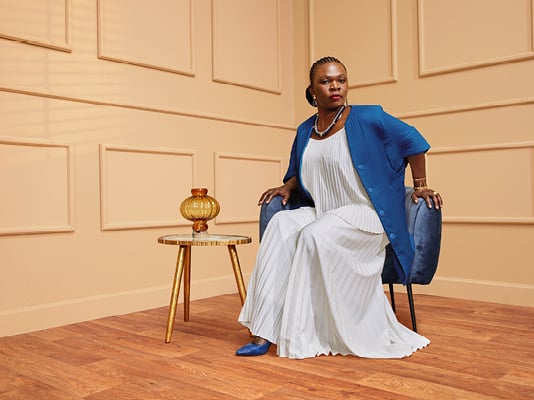
Why is ‘Why she leads’ important and where does it fit in in SA’s current context?
As a woman leader in the corporate environment, for me, representation matters. This campaign showcases women in leadership in Standard Bank – understanding the role Standard Bank plays in African countries where we’re present actually sends the message to many women that it’s possible to be a corporate leader on the continent
What do you think helped you the most to make a career as a woman?
It’s one thing to have the skills and capability which is non-negotiable, but I also don’t underestimate the power of people guiding and helping me chart a path that’s authentic to me. People who also speak up for me around tables I have no access to and where, let’s be honest, they may not be naturally biased towards me, as a woman, an African, and in the SA context, a foreigner.
Understanding the difference between, and importance of, my own leadership journey’s ‘Holy Trinity’: mentorship, coaching and sponsorship, has been a game changer for me. Leadership has a deep element of wisdom associated with it that comes with one’s own experience or one’s ability to lean on others’ experience to accelerate their own learning. So for me mentorship is a necessary aspect of learning from others.
As I mature in my own career and leadership practice, knowing when to be one of these things for others means I myself get better at how I ask for the support I need.
How can male corporate leaders become allies that grow women leaders?
We underplay the absence of allies for women in leadership and decision-making roles in the corporate environment.
I’ve had more male than female sponsors in my own career. Partly because there are more men in leaderships positions. Just that act of sponsorship – done deliberately and voluntarily – can shift the dynamic, because this is where male corporate leaders actually have a level of control.
I emphasise voluntary – when the act of supporting women is voluntary, the allyship goes deeper across levels and actually helps to nurture and develop a sustainable leadership pipeline. It also becomes ‘how we do things here’, which becomes a self-fulfilling act of leadership development.
Have you experienced impostor syndrome ? If so, how did you deal with those feelings?
Show me a leader who doesn’t have impostor syndrome! Yes, it happens to me and over time, I’ve come to acknowledge and accept it as a necessary part of growth.
Why would companies benefit from having more women at the top?
Companies that have gender-diverse decision-makers make better long-term decisions and are sustainably better performers. It’s necessarily about seeing the world through more than one lens when leading a company into the future.
What are the biggest changes you have seen in the industry in the course of your career?
The industry seems more human. A significant shift I’ve experienced is more acknowledgement of the individual’s contribution into collective outcomes at industry and society level. So, while we celebrate excellence, we no longer tolerate mavericks leaving a trail of destruction and disruption.
How should women support one another in their organisations?
Two ways are powerful for me. If you have the opportunity to mentor, coach or sponsor, seek out other women in your organistation, and when you’re in a decision-making position, don’t be afraid to actively prioritise other women in your mentoring, coaching and sponsoring activities.
How do you deal with being underestimated or undervalued?
Being underestimated is relatively easy for me. If a decision is mine to make, I make it without apology. I no longer feel the need to prove myself.
Undervaluing is a difficult one. I haven’t been undervalued for growth opportunities, but I’ve certainly been undervalued as far as pay. So, once I have the data and the language, I’ll raise this.
How do you continue to learn and expand your knowledge?
Traditional learning methods still work for me and then information exchange with experts/people who know more – people who know more are becoming more and more interesting – reverse mentoring from younger people has been an incredibly powerful learning tool for me.
"When you’re in a decision-making position, don’t be afraid to actively prioritise other women in your mentoring, coaching and sponsoring activities."